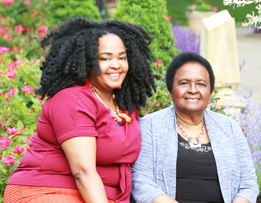 More African Americans Face Being Dementia Caregivers as Their Loved Ones Age
More African Americans Face Being Dementia Caregivers as Their Loved Ones Age
Guest Column
Ohio State Rep. Stephanie Howse remembers the series of odd behaviors that kept raising questions about her mother: potato chips in the freezer; her mother visiting a friend and couldn’t find her way back to the highway; a personality shift that was uncharacteristic.
An only child, Rep. Howse, D-Cleveland, talked with her mom. “‘Ain’t nothing wrong with me, everybody forgets stuff,’” she remembers her mother saying. Howse was thinking: “I am not just going to stand by and see something going on with my mom and not intervene,” she said.
Both she and her mother are used to the public eye. Rep. Howse serves the district her mother, Former Rep. Annie L. Key, represented. She’s tried to be open about the struggles she has faced as a caregiver. “Many times as an elected official, a public person, it can be very embarrassing for people to know your business or the turmoil in your home,” she said. “But I just felt at a point that I just didn’t have that luxury. I can’t afford not to do anything to help my mom,” Howse said.
Since the time that Howse learned her mother had mild cognitive impairment and now vascular dementia, she has dealt with hiring in-home care, financial struggles, placement of her mother in an assisted living facility, stress. Being a dementia caregiver is a lot. Add to that the fact that Alzheimer’s disease and dementia are not discussed openly in the African-American community and that contributes to isolation.
“I just think that we don’t talk about it even in our environments, even at church we don’t talk about it,” Howse said. “Culturally speaking a lot of us are in a mindset of ‘we keep family business in family business. We don’t need everybody in our business and we are going to deal with it the way we are going to deal with it.’ But that prevents people from sharing their story and just seeking some of the resources and support,” she added.
On June 24, the Alzheimer’s Association is hosting a free statewide virtual forum called “Empowering African Americans in Navigating Dementia Care.” With one in three seniors dying of Alzheimer’s or another dementia and African Americans being twice as likely to get Alzheimer’s or dementia than white individuals, being a caregiver is something more African Americans face.
“We know that when caregivers are armed with education about the disease, support and a good care plan it helps them and their loved one,” said Melissa Dever, program director for the Alzheimer’s Association. “We are intentionally reaching out to provide practical tips on recognizing the disease, obtaining a diagnosis and navigating care needs after a diagnosis.”
To register for the caregivers’ forum, people can call the Alzheimer’s Association’s 24/7 Helpline at 800.272.3900. At the event, participants will hear from a physician who specializes in geriatric medicine, a caregiver, and the managing ombudsman of Pro Seniors, which helps seniors with long-term care and legal issues.
Part of the discussion will be how to know the difference between Medicare and Medicaid benefits when considering home care options and long-term care needs. “As a black caregiver, the financial pressure that has been put on me at times, it is only God for real,” Howse said. She said at her mother’s facility, she had to use the family’s funds to pay for two years before her mother became eligible for Medicaid. “We’ve got to have some real conversations on financial planning,” Rep. Howse added. “I really want to be able to be a source of support for people,” she said.
While she said her mother’s personality has changed since the diagnosis, she is thankful that her mother can still communicate and is still mobile. She said she sees a therapist once a month to help process the stress. “I have constantly had a counselor to talk through stuff,” Rep. Howse said. She said during this journey as a caregiver, she has learned to put herself first “so I can be what God wants me to be and needs me to be at any time. It has helped me in my journey as a caregiver.”
Howse said she first tapped into the Alzheimer’s Association for some social engagement programs for her mother. While she said her mother has not really accepted her diagnosis, “she knows it is an issue and she knows it is a problem.”
While being a dementia caregiver is challenging, Howse is driven by her love for her mother and said she will continue to seek the best care for her. “I think it is irresponsible to let someone that you love just do things because that is what they want to do when you know that they do not have the mental capacity to necessarily make decisions that are in their best interest,” she said.
